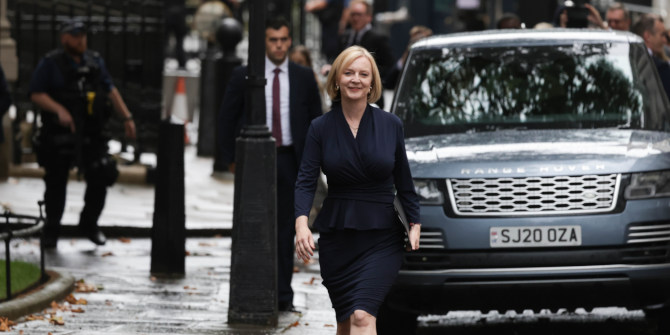 In the coming weeks the new press regulator IPSO will unveil it’s board and officially launch. We can also expect an announcement about the Recognition Panel established under the Royal Charter to audit the new system of newspaper self-regulation. Those expecting to finally see the implementation of Leveson’s reforms are likely to be disappointed however, argues Damian Tambini.
In the coming weeks the new press regulator IPSO will unveil it’s board and officially launch. We can also expect an announcement about the Recognition Panel established under the Royal Charter to audit the new system of newspaper self-regulation. Those expecting to finally see the implementation of Leveson’s reforms are likely to be disappointed however, argues Damian Tambini.
Back in January, when I looked forward to the development of press regulation in 2014, I said that one possible scenario was that the delay and filibuster over press regulation would continue well into 2015. I am beginning to believe that the impasse could last much longer than that.
Given recent statements, in particular from The Guardian newspaper, the most likely outcome is that there will be no ‘official’, recognised, press regulator. The Royal Charter and the Recognition Body could continue to exist indefinitely as a permanent Sword of Damocles hanging over the press, rather than as the active system of ‘incentives’ that Leveson proposed to improve press behaviour by rewarding those who joined an approved regulator by granting them legal protections.
Whilst the Media Standards Trust and Hacked Off have been at pains to point out the lack of ‘Leveson compliance’ of the new body, this may in practical terms be irrelevant, simply because the new body set up by the newspapers, IPSO, does not want to be recognised by the public audit scheme established by the Royal Charter. In the unlikely scenario that its main rival, IMPRESS, does seek recognition, it may not meet the relevant criteria.
Disincentives for recognition
Readers will recall that the costs (section 40) incentives established under the Crime and Courts Act come into effect if, and only if, a self-regulatory body is recognised. The drafting of the Crime and Courts Act in that sense creates a disincentive to any self-regulator seeking recognition. Now that The Guardian seems to have gone cold on belonging to a regulator under the Royal Charter, it is becoming less likely that the press will set up a self-regulator that seeks recognition, given that so doing would trigger new costs and risks to newspapers.
What has Changed? The Financial Times and The Guardian have shown (some of) their cards.Speaking at the LSE in April, Editor of The Guardian Alan Rusbridger called the Royal Charter a ‘medieval pantomime horse’ that he ‘wants no part of’. This has widely been taken as an indication thatThe Guardian will not support a self-regulator that seeks recognition. Now that the Financial Times have indicated that they will not join IPSO, that only leaves The Evening Standard and the regional press, and they were even less keen than The Guardian on the Royal Charter. Peter Preston, former Editor ofThe Guardian and an influential thinker in Alan Rusbridger’s stable is therefore correct that IPSO is the only game in town – at least for a while.
The Sword of Damocles
There are of course flaws with the ‘permanent’ sword of Damocles system, notably:
- a stalking horse regulator; if not IMPRESS, perhaps some other group that competes with the press and seeks to increase their costs could in theory trigger costs risksby being recognised.
- the ‘convergent effect’ of the Leveson/Charter arrangements would be lost. Whilst many criticised Leveson and the Charter for ignoring online, the system in fact would have created incentives for all providers of news to self-regulate or seek inclusion within a self-regulatory body, as a way of reducing liability. Without the incentives kicking in, there is little chance IPSO or even IMPRESS will start to include online news media.
- Will the Royal Charter sword constitute a chilling effect in itself? Whilst unlikely, it could be argued that the press will be meek because they do not want another scandal to lead to widespread calls for a recognised regulatory body. But reformers who argue that IPSO is ineffective cannot have it both ways.
- Reformers will of course argue that in structure, the new system has all the flaws of the old: and that the Regulatory Finance Committee holds all the cards. This is why Hacked Off and others maintain that it is not sufficiently independent of industry, lacks legitimacy, is captured, represents no change from the old system and so forth.
What could be done with IPSO
Now that the Guardian is edging towards IPSO, and a – relatively liberal minded and likely Guardian-reading – chair has been appointed, the focus will shift onto what needs to change there. Given the current structure, his options are limited as Alan Rusbridger discussed in the Polis Conference at LSE:
The Regulatory Finance Committee Independence of the self regulator from the press themselves is a key challenge for the long term legitimacy of IPSO. The PCC was subject to ongoing criticism because its finance committee, (the Press Board of Finance) was seen as the puppeteer of the regulator as a whole, and the new structure does not seem very different. Can the new board establish more independence?
Audit If not by a Royal Charter, Rusbridger also wants some form of external audit, to prevent backsliding and industry capture and to maintain standards. He said, “I would like to see IPSO have an auditor, a court of appeal”, and that he would see who was appointed chair and talk to them.
Whilst the Financial Times has now left, and the old ideal that the PCC will represent the entire newspaper industry is now unattainable, The Guardian might yet join when the board is revealed early next month. If The Guardian joins, this will seal the legitimacy of IPSO, so Rusbridger and the Scott Trust do have some bargaining power. Rusbridger is likely to be making many more demands before he and the Scott Trust consider getting into the IPSO bed. They might encourage IPSO to take a longer term and more positive view of what journalism can take from the current crisis. As he said at the Polis Conference: ‘if you dump the Royal Charter how do you deal with the costs and risks of investigative journalism?’.
The debate about the details will be intense, and it could be argued that whilst the costs provisions in the Crime and Courts Act dis-incentivise membership, there remains the question of the damages provisions (sections 34-39), the impact of which will depend more on judicial interpretation.
Status quo in futurum
In this context, the shortly to be announced ‘Recognition Panel’ might develop a function that is more ceremonial than regulatory. Who knows, perhaps they will never be asked to recognise a press regulator. They may eventually be issued with wigs, tights and perhaps swords, and be asked to process down Fleet Street with the Lord Mayor’s procession as a reminder to the press that they are still drinking in the last chance saloon.
But it is too soon to write off the Charter. Precisely what risks newspapers are running by toughing it out in this way is extremely difficult to calculate, and going for recognition is always there as an option in the longer term.
Where does this leave the victims of press abuses in recent years? They are likely to feel duped, let down and permanently Hacked Off, and continue their campaign. It is not over yet.
Note: This article was originally published on the LSE’s Media Policy Project blog and gives the views of the author, and not the position of the British Politics and Policy blog, nor of the London School of Economics. Please read our comments policy before posting.
About the Author
 Damian Tambini is Research Director of the Media and Communications Department, Chair of the Research Committee, Director of the Media Policy Project and convenor of the MSc in Media and Communications (Governance). He is an Associate Fellow at the Institute for Public Policy Research (IPPR) and at the Oxford Internet Institute. He is also a fellow of the Royal Society of Arts and serves on the Advisory Groups of: The Oxford Media Convention, Reporters Without Frontiers POLIS and the Open Rights Group. He has also served on the Communications Consumer Panel from 2009 – 2011.
Damian Tambini is Research Director of the Media and Communications Department, Chair of the Research Committee, Director of the Media Policy Project and convenor of the MSc in Media and Communications (Governance). He is an Associate Fellow at the Institute for Public Policy Research (IPPR) and at the Oxford Internet Institute. He is also a fellow of the Royal Society of Arts and serves on the Advisory Groups of: The Oxford Media Convention, Reporters Without Frontiers POLIS and the Open Rights Group. He has also served on the Communications Consumer Panel from 2009 – 2011.







